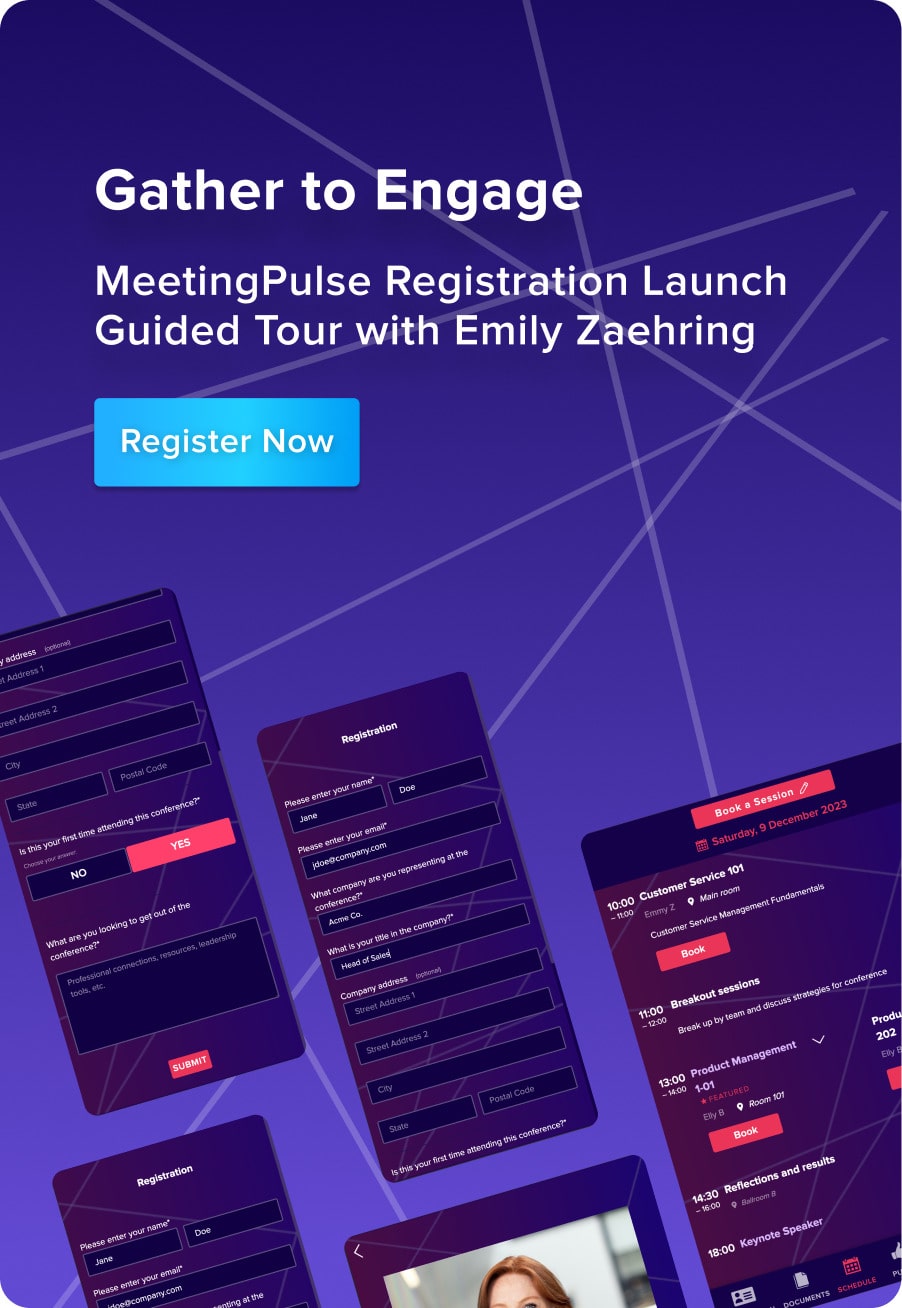Here at MeetingPulse, we spend a lot of time working with corporate event experts. Now more than ever, virtual events are key to building their brand, nurturing lasting relationships with their customers, and gaining a competitive edge for their business.
Done right, virtual events represent a huge opportunity, and have a lot of advantages over in-person events — especially now. The virtual event facilitators we partner with have track records of creating amazing online experiences for their businesses. We talked to them to learn more about the strategies they use to create virtual events attendees love. Here are some of their top tips:
Make Your Event Structure Clear

The experts we talked to all recommended designing and communicating a clear structure well in advance of your event. This ensures you’re attracting the right people to your event — qualified leads, potential customers, and other important stakeholders.
Be intentional about the structure of your event. Of course, event structures are situational — they vary depending on what the event facilitator is trying to achieve. But one key thing to keep in mind is striking a balance between active and passive activities. When your attendees are actively participating, they’re engaging with you — like sharing their views in a discussion, or taking part in a poll. Passive portions of the event are simply time attendees spend watching. The perfect event structure strikes a balance between these passive and active times to ensure your attendees remain involved throughout.
Bring the Local Culture to Your Event
Making the transition from physical events to virtual events gives you the opportunity to use the influence of your host city in new ways. Maybe your event is usually hosted in a unique location like Paris, Seattle, or Mexico City. Find creative ways to capture the essence of that local flavor!
Some of our partners have hosted virtual performances from local musicians and included live or recorded video of the event destination. It’s a great way for attendees to get a sense of the experience of travelling to an exciting location from the comfort of their own homes.
Choose the Right Virtual Event Tools

There are many tools out there to help host online events, and it’s important you choose the ones that work best for your business. Look for platforms that are scalable, allow you to verify your participants identity, and have built-in audience interaction tools.
Related: The 9 Best Virtual Event Software Platforms
The event facilitators we work with use a variety of video delivery platforms — including On24, Zoom, Vimeo, Webex, and YouTube. But one thing they all have in common is that they use MeetingPulse to take their virtual events to the next level. Learn more about how MeetingPulse provides scalable event infrastructure and audience engagement solutions.
Play A Game
We humans love to have fun, and games are an important part of that. Find ways to build moments of joy into your virtual event by incorporating fun activities like raffles and quizzes. Maybe you can have a competition and give out prizes, or perhaps you’ll organize speed networking. The possibilities are endless — get creative!
Virtual formats provide new ways to create connections and drive engagement between event participants. Surprise and delight your audience and watch your event engagement metrics skyrocket.
MeetingPulse has all the tools you need to inject some fun into your next virtual event — including raffles, quizzes, and interactive polls. Learn more about our audience participation and engagement tools.
Break Content into Small Chunks

Mix up the format of your event and give your audience regular breaks. Short segments keep your audience focused, and different activities like breakout sessions, speed networking, and interactive discussions ensure participants stay engaged throughout your event.
If you’re planning an event with multiple formats, make sure you have the tools you need to facilitate it. At a minimum, you’ll want to be sure you can smoothly switch between multiple hosts, easily move into breakout sessions, and encourage attendee participation.
Actively Manage the Event
Event facilitators need the ability and tools to actively control and manage the event. That starts with ensuring the meeting is secure from external threats, but also demands event management tools to proactively manage participant experiences.
Create an agenda and stick to it. Consider if you want to require event attendees to share their name and company, or be able to participate anonymously. Hosting a live Q&A session? Moderate the questions to ensure your speakers are answering the ones that matter most. Be intentional about how you run the event, and you’ll enjoy successful virtual events with high ROI for your attendees and your business.
Collect & Analyze Data

One of the most important advantages of virtual meetings is the data and insights that event facilitators can generate and leverage. Actively collect information from your participants through quizzes and raffles, and use tools like audience polls at meetings and live survey tools for audience to build an understanding of the issues that matter to your participants.
Analyze these data points with our live sentiment analysis tools during & after your event and use the insights gained to make data-driven decisions to improve for next time. On top of that, we bet you’ll find valuable insights in your event data that will shape improvements to other customer touch points, and will ultimately help you make better business decisions.
***
Adopt these strategies, and your next virtual event will blow all your previous ones out of the water. Your event attendees will be impressed, your customer relationships will grow, and your business will prosper.
MeetingPulse provides a range of virtual event management and engagement tools to make your next virtual event a success. Try MeetingPulse for free


















